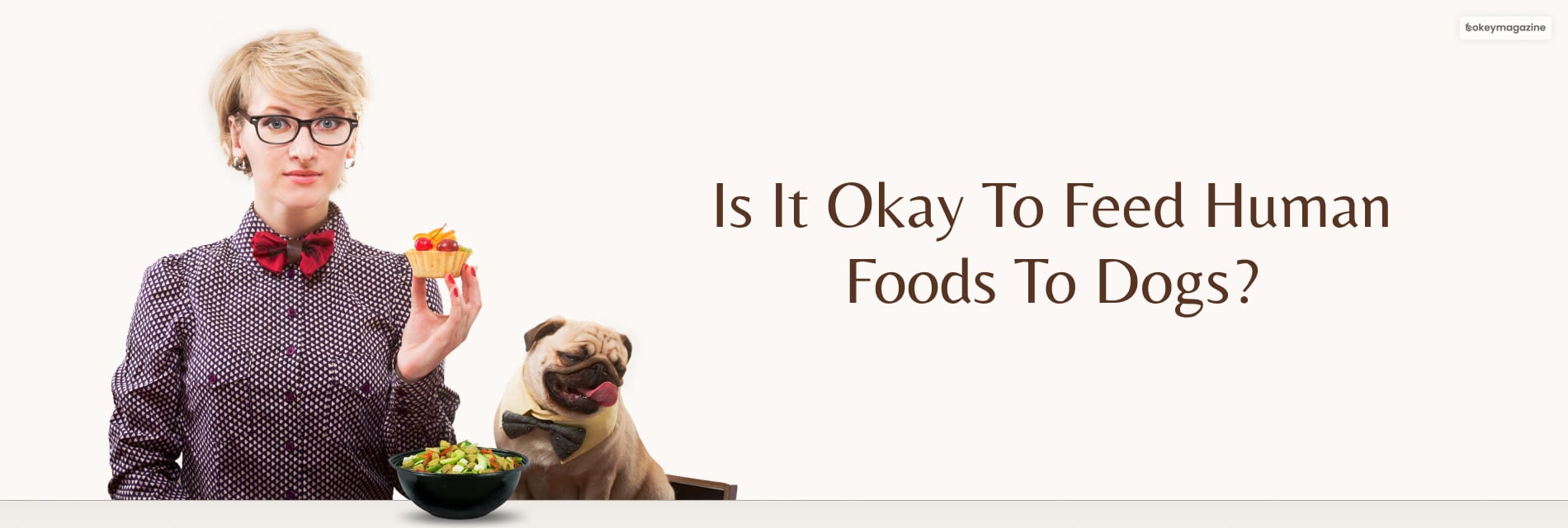
Is it Okay To Feed Human Foods To Dogs?
How many times has it happened to you that you are eating something, but your dog is sitting just beside you, staring at you with those irresistible puppy eyes, hoping for a taste of your meal? It’s a common scenario for dog parents. However, it often raises the question, ‘Is it Okay To Feed Human Foods To Dogs?’ We will explore the answer to this question in this article.
Is It Okay To Feed Human Food to Dogs?
Many of us are under the illusion that dogs can consume everything. But that is not true. Some human foods are very fatty and rich, which can be difficult for dogs to digest. It may lead to vomiting, pancreatitis, and diarrhea. In addition, human food also contains a high amount of salt or sodium, which is not ideal for dogs.
So, there is no straightforward answer to this question because while sharing a bite of your food might seem harmless, it’s important to know which foods are safe and which can be harmful to your canine companion.
What May Happen If You Feed Human Foods To Dogs?

Feeding your dog from your plate can be lovable and adoring, but it is unhealthy for dogs. You might think that you love them more, and the dogs would definitely love to eat from your plate.
However, your pup does not know what to eat and what not to. And this gets more dangerous for them when you have no idea about their food and health.
Dogs Might Face Digestive Problems
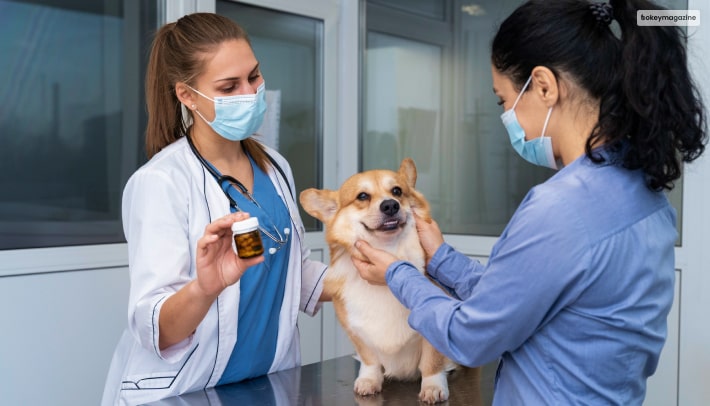
Most human food is sodium-rich which is not good at all for dogs. They are not habituated to the fatty richness of our food. Even if you want to make them eat human food, you will see them facing severe digestive problems.
So, this is not the area of an experiment that you want to apply to your lovable pet.
They do not have a voice to let you understand if they feel digestive issues. So, you need to be their voice here.
Table Foods Are Toxic For Dogs
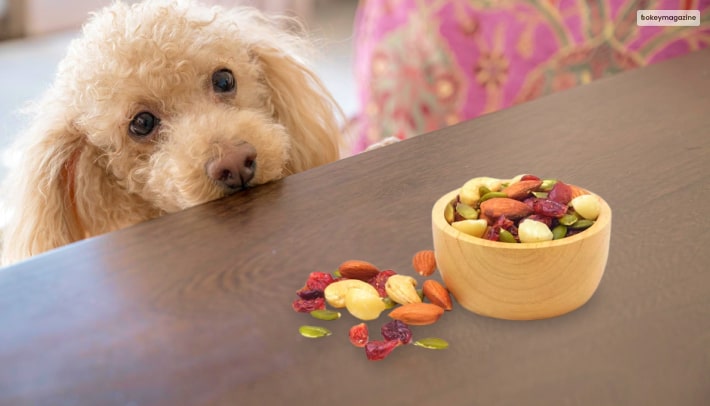
Human foods to dogs can be toxic. For a small insight, chocolate, grapes, raisins, macadamia nuts, onions, and almonds.
Well, in this modern world, we do not get enough time for cooking. However, we have alternatives like ordering from restaurants.
However, you do not know when it was made and what type of spices are used to make the recipe. We do not think twice about feeding our pets these outside foods.
Even if you go for processed food, it uses artificial sweeteners; for instance, xylitol is very harmful to dogs’ health.
Dogs Might Gain Weight

You might think that few human foods to dogs would not affect their health. But this is a totally wrong concept. In fact, a 20-pound dog with a single ounce of cheddar cheese can weigh like half a hamburger for a person.
For more clarity, 10% of the total daily caloric intake by a human can be dangerous for a dog. So, a few human foods to dogs can cause a huge weight gain of a dog and ultimately lead to heart problems, arthritis, and diabetes.
Dogs Might Face Unwanted Behavior
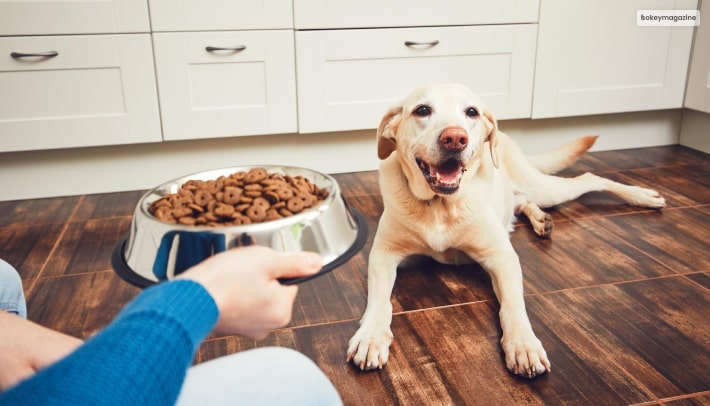
Being filled up with human food might trigger a dog’s behavior. It’s called begging behavior.
Well, when the dog knows that they eat the same thing that you eat as well, they might decide to take bites from the table.
So, it might be lovable for you, but when guests come into the home, they will not like these inappropriate approaches from the dogs.
Well, dogs who are already filled with human food taste might not want to go back to their own foods. These behavioral changes can be difficult for the dogs to be healthy.
Which Human Food Is Safe For Dogs to Eat?
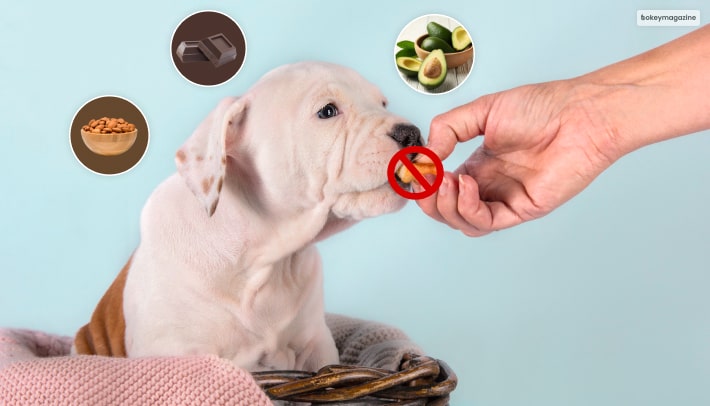
Here is a list of human food that is safe for our dogs:
Eggs
Fully cooked eggs are a good source of minerals and vitamins. It is the origin of a lot of proteins as well. Dogs commonly face nausea issues. Well, it is scientifically proven that eggs can help them get rid of this issue.
Salmon
Go for cooked and boneless salmon. These are safe and healthy sources of food for dogs. Moreover, salmon is rich in omega-3 fatty acids and can help prevent inflammation and skin issues in dogs.
White Meat
White meat, like chicken, turkey, and fish, is a very good source of protein for dogs. But make sure it’s cooked and boneless before feeding it to your furbaby.
Peanut Butter
Peanut butter is high in protein and healthy fats and can be a good treat option for dogs. It can also be used as a meal topper. But first, ensure that it’s unsalted and free of xylitol.
Popcorn
Dogs can also have plain, air-popped popcorn as a treat. This means no added butter, salt, or other seasonings. Plain popcorn contains fiber and is low in calories, which means that dogs can have popcorn as a treat occasionally.
In addition to these foods, dogs can also eat some fruits and vegetables, such as:
- Carrots: Low in calories and high in vitamins, minerals, and fiber. Great for eye health.
- Green Peas: Rich in vitamins, minerals, and protein. Best given in moderation.
- Celery: High in fiber and safe for dogs.
- Cucumbers: Low-calorie treats, high in vitamins and minerals, especially vitamin K.
- Zucchini: High in fiber and low in calories, can be given raw or cooked.
- Pumpkin: Excellent for digestive health, high in fiber.
- Green Beans: Packed with calcium, iron, and vitamin K. Serve plain and unsalted.
- Spinach: Full of iron, vitamin K, and antioxidants. Best given in moderation due to high oxalate content.
- Apples: High in antioxidants and fiber. Avoid seeds and core.
- Bananas: Rich in potassium, biotin, and fiber. High in sugar, so give it in moderation.
- Blueberries: Packed with antioxidants, vitamins, and fiber. Low in calories.
- Oranges: High in vitamin C. Give in small amounts due to high sugar content.
- Watermelon: Hydrating and low in calories. Remove seeds and rind.
Which human foods are not safe for dogs?
There are lots of human foods that dogs cannot have because their digestive system cannot properly process certain ingredients present in these food items. Some examples are nutmeg, lemon, raisins, grapes, macadamia nuts, onions, tea, coffee, etc. We have explained in detail why these food items are not good for dogs.
Nuts
Dogs should not have nuts because they are high in fat and it can be dificult for them to digest. Eating nuts like almonds, pecans, and walnuts can lead to vomiting, diarrhea, and abdominal pain. It can also contribute to obesity and pancreatitis.
You should also avoid giving macadamia nuts as it contains an unknown toxin that affects dogs.
Chocolate
It contains theobromine and caffeine. Both these stimulants are not good for a dog’s digestive system. Eating a whole bar of chocolate can lead to vomiting, diarrhea, seizures, and even death, depending on the weight and age of your furbaby.
Avocado
Avocados contain persin. It is a type of toxin that is poisonous to dogs and can cause vomiting, diarrhea, and heart congestion.
Grapes and Raisins
These fruits contain a toxic substance that is highly toxic to dogs. The exact substance in grapes and raisins that causes this toxicity is not definitively known, but recent research suggests that tartaric acid may be the culprit.
Coffee
Coffee contains methylxanthines, which are toxic to dogs. Drinking coffee can cause restlessness, rapid breathing, heart palpitations, and muscle tremors.
Raw Eggs
While cooked eggs are a very good source of essential vitamins and minerals, you should avoid giving raw eggs. It can contain Salmonella or E. coli, which an lead to food poisoning and biotin deficiency.
In addition to these foods, dogs can also eat some fruits and vegetables, such as:
- Carrots: Low in calories and high in vitamins, minerals, and fiber. Great for eye health.
- Green Peas: Rich in vitamins, minerals, and protein. Best given in moderation.
- Celery: High in fiber and safe for dogs.
- Cucumbers: Low-calorie treats, high in vitamins and minerals, especially vitamin K.
- Zucchini: High in fiber and low in calories, can be given raw or cooked.
- Pumpkin: Excellent for digestive health, high in fiber.
- Green Beans: Packed with calcium, iron, and vitamin K. Serve plain and unsalted.
- Spinach: Full of iron, vitamin K, and antioxidants. Best given in moderation due to high oxalate content.
- Apples: High in antioxidants and fiber. Avoid seeds and core.
- Bananas: Rich in potassium, biotin, and fiber. High in sugar, so give it in moderation.
- Blueberries: Packed with antioxidants, vitamins, and fiber. Low in calories.
- Oranges: High in vitamin C. Give in small amounts due to high sugar content.
Watermelon: Hydrating and low in calories. Remove seeds and rind.
Which human foods are not safe for dogs?

There are lots of human foods that dogs cannot have because their digestive system cannot properly process certain ingredients present in these food items. Some examples are nutmeg, lemon, raisins, grapes, macadamia nuts, onions, tea, coffee, etc. We have explained in detail why these food items are not good for dogs.
Nuts
Dogs should not have nuts because they are high in fat and it can be dificult for them to digest. Eating nuts like almonds, pecans, and walnuts can lead to vomiting, diarrhea, and abdominal pain. It can also contribute to obesity and pancreatitis.
You should also avoid giving macadamia nuts as it contains an unknown toxin that affects dogs.
Chocolate
It contains theobromine and caffeine. Both these stimulants are not good for a dog’s digestive system. Eating a whole bar of chocolate can lead to vomiting, diarrhea, seizures, and even death, depending on the weight and age of your furbaby.
Avocado
Avocados contain persin. It is a type of toxin that is poisonous to dogs and can cause vomiting, diarrhea, and heart congestion.
Grapes and Raisins
These fruits contain a toxic substance that is highly toxic to dogs. The exact substance in grapes and raisins that causes this toxicity is not definitively known, but recent research suggests that tartaric acid may be the culprit.
Coffee
Coffee contains methylxanthines, which are toxic to dogs. Drinking coffee can cause restlessness, rapid breathing, heart palpitations, and muscle tremors.
Raw Eggs
While cooked eggs are a very good source of essential vitamins and minerals, you should avoid giving raw eggs. It can contain Salmonella or E. coli, which an lead to food poisoning and biotin deficiency.
So, is it okay to feed human food to dogs?
Yes, you can feed human food to dogs as long as it is an ingredient that is safe for dogs to consume. Moreover, it will add variety to your dog’s diet and make it more interesting and flavorful. This is particularly beneficial for picky eaters.
Moreover, different textures from foods like crunchy carrots or soft bananas can make mealtime more enjoyable for your dog. But remember, moderation is key when feeding human food to dogs. Avoid overfeeding, as it can lead to obesity and other health issues.
Human foods should only be a small part of your dog’s diet. The majority of their nutrition should come from high-quality dog food that is specifically formulated to meet their dietary needs.
You should also consult your vet before feeding human food to your dog or making any changes to ensure they are safe and appropriate for your dog’s specific needs. This is especially important if your dog has any underlying health conditions.
Read Also:



















Post Your Comment